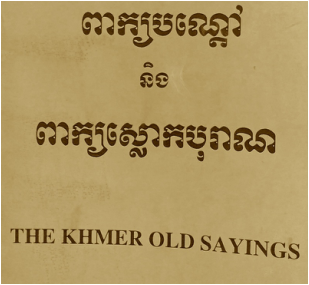| BANYAN BLOG |
banyan blog
|
A few weeks ago I embarked on a long flight back home to visit family and friends in the U.S. for the summer. It’s hard to believe almost a year has passed since we left for Cambodia. It’s nostalgic to be back home and enjoy the things that I missed. Some of them are simple things I took for granted like a fresh cool breeze, expanses of luscious green grass and trees, playgrounds that are shaded, and traffic that moves in an organized fashion. Some things I deeply miss, I can’t get back. I’ve been in a writing limbo over the last few weeks, partly from being busy trying to do as much as I can while I am here. The other part, the seemingly lack of inspiration. As the days went by, I could feel my motivation to write slipping away from me, or so I thought. It was easy to be inspired in Phnom Penh with the cacophony of restless images and an unknown life beckoning me to rediscover it. But being back home is different. It’s a different kind of noise, a known life and routine, and a different kind of calling. I’ve realized the source of inspiration here is quieter, calmer and perhaps more soothing because it has the familiarity of home. Instead of being drawn by life outside the house, it’s what’s inside my childhood home that inspired me to write this.  The Khmer Old Sayings Book Before my mother left to visit us in Cambodia she setup a small memorial for my father in the basement. The memorial has a large picture of him hanging on the wall and a shelf with electric candles and flowers. There is a small table adjacent to his picture that carries his favorite instrument, a tike, which he purchased from Cambodia and tried to learn in his older years. His children’s diplomas from high school, college, and postgraduate degrees also surround him. What is most fascinating about this modest memorial is the table under his photo, which carries stacks of my father’s favorite books. She understood his love of reading, and it’s almost as if she left it there for him to enjoy in his afterlife. One of the books in particular that caught my attention was the “The Khmer Old Sayings” book by Ms. Pich Sal. My father loved to recite Khmer sayings. It is one of the clearest memories I recall about his personality. He loved to say these phrases around the house and often spoke them with his friends. Perhaps it was a way for him to keep alive the knowledge and love he had for Khmer literature. Growing up I didn’t understand the significance of these sayings. I knew he enjoyed speaking them, knew many, and were special phrases that were beyond my comprehension. Now that I am relearning Khmer, I am discovering the beauty of these phrases, and I can almost hear his voice, as he would recite some of the same ones over and over again. Favorite Phrases Now that I look back, many of the phrases my father liked to recite were teaching important life lessons. Back then they were just words to me but, as I learn more about the language I am finding that these short phrases are a window into Khmer culture, character and mentality. Most of his favorite phrases are in this book of Khmer sayings, one of the many books he’s marked all over with his signature style. My mother has patiently helped me go through it to find some of his favorites, read them to me and explain their meaning and significance. Importance of Family My father loved to talk about the importance of family, particularly respecting and showing gratitude to one’s parents, which is a key value in Khmer culture. Some of his favorite phrases to recite in this context was: "Maday kit kaun doay chrova deung. Kaun kit maday vinh doay preah brae kroay." ម្តា យគិតកូនដោយច្រវាច្រដេញ កូនគិតម្តា យវញិ ដោយច្រះប្ច្រដច្ោយ។ [If you don't have Khmer unicode and would like to read the Khmer script of the phrases, please see the attached PDF at the end of the story.] The English translation of this phrase is: "A mother thinks about her children like an oar to a canoe. Children think of their mother like the Buddha who turns his back." He always reiterated to his children the love that parents have for children was immeasurable, and unparalleled to the love children have for their parents. In this phrase, he was trying to tell us that parents always think, worry and love their children, but children don’t often think of their parents in the same way. When he became a grandfather one of the phrases I recall him vividly saying was: "Sralanh kaun muoy tao. Sralanh chao muoy thaing." ស្រលាញ់កូនមួយតៅ ស្រលាញ់ចៅមួយថាំង។ The English translation of this is: “Love your children one tao (a unit of measurement, a large basket to put rice in). Love your grandchildren one thaing (one thaing is equivalent to 2 taos).” My parents have eight grandchildren between four children. My father loved being a grandfather, and relished being called “Ta” (grandfather). He adored his grandchildren. The meaning in this proverb is that as a parent you love your grandchildren twice as much as you love your children. Another one of my father’s favorite quotes is about the importance of taking care of parents: "Oay mae, euv, pisar toan bampong ko nov chhor." អោយម៉ែឪពិសារ ទាន់បំពង់ករនៅឈរ។ It is a rudimentary phrase that translates to: “Let your parents eat while their throat is in vertical position.” My father always reiterated to us the importance of loving and taking care of one’s parents. He always reminded us that they were not going to be around forever. We needed to show appreciation to them and take care of of them while they are still here, “while their throat is still standing.” What he meant was, it is important to spend time with your parents while they are still healthy, to take good care of them when they are still around. When they are too sick, laying down, it is too late. Working Hard He also taught us the importance of studying hard and working hard to achieve our dreams. He would say: "Cheh mok pi rean, mean mok pi rok." ចេះមកពីរៀន មានមកពីរក។ In English this means: “You learn from studying, you have wealth from working” He wanted us to understand that if you study hard, you will learn. If you work hard you will have wealth. Humility Humility is very central to Khmer culture and many Khmer sayings teach the importance of being humble and not too brag. A phrase my father would say often about this is: Angkuy leu chang eh, leuk khluon eng. អង្គុយលើចងេ្អរ លើកខ្លួនឯង។ This literally means: “Sit in the basket, lift up yourself” It means, don’t brag about yourself too much. If you sit in the basket you cannot lift yourself. Reliving Memories There are many more phrases he loved to recite. However, with the passage of time, it has been difficult for our family, especially my mother, to remember them all. In addition, he loved many complex ones, but these were too difficult for me to understand, let alone explain. Many Khmer proverbs are very complex and one has to have a deep understanding of the language to fully comprehend the true meaning of these beautiful proverbs. Unfortunately, I am not there yet. Nonetheless, finding this book was a precious treasure. We have been able to relive his memory through something that defined his character, personality and unique spirit. We have been able to share his love and appreciation for the beauty of the Khmer language. Once the exercise is over, the book will return to the modest memorial for him to enjoy and to recite in his afterlife. I hope one day I will pick up this book again and be able to read in Khmer all these phrases for both of my parents to hear. More than that, I hope to fully understand the complex proverbs that have alluded me today. And perhaps one day I can share these wise words to my children, and tell them his favorite proverb of how their 'Ta' loved them twice as much. Epilogue: Parables--A Window to Khmer culture In learning these phrases, I am discovering my father's love for the art of the Khmer language and understanding the complexity of the language and culture. Khmer is a beautiful language. For the native Khmer speaker the words roll off the tongue and sound tender, especially when someone is reciting poetry. Nothing is more poetic to me now than hearing these parables. The language is rich in storytelling through parables and proverbs using metaphors and tales to teach life lessons. If you would like to learn more Khmer sayings, the phrases below are some examples of other Khmer proverbs that teach important life lessons of responsibility, leadership, karma, cleverness, trust, manners, discipline, power, humility, respect, gratitude and appreciation for parents. These are all values central to Khmer culture. 1. RESPONSIBILITY "Sok neak na, kbal neak nung" សក់អ្នកណា ក្បាលអ្នកហ្នឹង។ English translation: Your hair, your head. Meaning: This was a proverb widely used during the Khmer Rouge that has a negative connotation. During the Khmer Rouge, people had to look out for themselves in order to survive. You couldn’t trust anyone and it was dangerous to help people, therefore “your hair, your head” means it is your responsibility and it is none of “my” business. It means that you need to look out for yourself. This phrase is still used today and has negative implications in today's society. Another proverb with a more positive connotation is: "Khloun ti peung khloun" ខ្លួនទីពឹងខ្លួន។ English translation: Depend on yourself first. Meaning: This proverb, which is advice given in Buddhism, means that we should depend on ourselves first before asking others for help. 2. LEADERSHIP "Teuk trocheak, trei kom" ទឹកត្រជាក់ ត្រីកុំ។ English translation: When the water is cold, the fish will gather. Meaning: This phrase encourages people who are leaders (people who have staff, to be kind and treat their staff well). When they treat them well, the staff will be loyal and will attract other people to work for them. 3. KARMA "T’wer la-or ban la-ar, t’wer aa-krok, ban aa-krok." ធ្វើល្អបានល្អ ធ្វើអាក្រក់បានអាក្រក់។ "T’wer la-or ban la-ar, t’wer aa-krok, ban luoy." (new) ធ្វើល្អបានល្អ ធ្វើអាក្រក់បានលុយ។ English translation: Do good, get good. Do bad, get bad. Do good, get good, Do bad, get money (new) Meaning: This lesson is derived out of Buddhism to illustrate karma. With a majority of Cambodians being Buddhists, karma is always something Khmers are mindful of. If you do something good, you gain merit and get something good in return. If you do something bad, you will ultimately get something bad in return. The second phrase is a new saying, which is more of a sarcastic criticism on the culture of corruption in present day, that even if you do something bad you will get good (money in this sense). 4. CLEAVERNESS "Ang tong veng, chhnang veng." អន្ទង់វែង ឆ្នាំងវែង។ English translation: Long eel, long pot Meaning: This phrase is from a short story (from a longer series about two men and their wives. One wife is clever, helpful and generous. The other is not as clever, lazy, and selfish). In this story, one of the men (who has the lazy wife) brings home an eel. He asked the wife to cook it. She didn’t know what to do and she searched around the house for a long pot to cook the eel. This phrase is used when making fun of someone who is not clever. 5. TRUST "Kom tuk chet mek, kom tuk chet pkay. Kom tuk chet prapun tha kmean sahay, kom tuk chet maday tha kmean bamnol." កុំទុកចិត្តមេឃ កុំទុកចិត្តផ្កាយ កុំទុកចិត្តប្រពន្ធថាគ្មានសាហាយ កុំទុកចិត្តម្តាយថាគ្មានបំណុល។ English translation: Don’t trust the sky, don’t trust the stars. Don’t trust your wife doesn’t have affair. Don’t trust your mother doesn’t have any debts. Meaning: This is a phrase from a story about a girl who went to go find firewood in the forest. While she was in the forest she saw the sky was getting dark. She thought it was going to rain so she poured her water out to get the water from the rain. She waited for the rain but it never came. Then the sky began to clear, then she had no water. She trusted the sky too much. The lesson here is don’t trust anything or anyone 100 percent. The connection about your mother’s debt is if the mother gets into serious gambling and has debts. 6. MANNERS "Som-dey saw cheat, meayeat saw pouch." សំដីសជាតិ មាយាទតពូជ។ English translation: Words show personality, Manners show your family. Meaning: When people hear you speak they see how you are. When they see you do something, then they see how your family behaves, and it is a direct reflection on your parents. This phrase illustrates the importance of upholding one’s reputation. The lesson here is to be careful of the words you choose as it will show who you are. And the way you behave will be directly linked to your family’s reputation. A family's reputation is very important in Khmer culture. "Srey sor doch chan, ter meayeat men ban doch chhkae krom phteah." ស្រីសដូចចាន តែមាយាទមិនបានដូចឆ្កែក្រោមផ្ទះ។ English translation: White skin like a plate, but manners like a dog under a house. Meanings: This phrase is addressed to a girl. That no matter how pretty you are, if your manners are bad then you are worse than the dog under the house. It teaches the lesson for girls that don’t think you are so pretty that you forget about your manners. 7. DISCIPLINING CHILDREN "Bot dek toan tov kdao, prodao kaun toan nov khmeng." បត់ដែកទាន់នៅក្តៅ ប្រដៅកូនទាន់នៅក្មេង។ English translation: Fold the metal while it’s still hot. Discipline your child when they are still young. Meaning: Discipline children while they are still young, when their minds, personality and behavior can be “bended” or influenced. 8. POWER "Phnom muoy men ach mean khla pi." ភ្នំមួយមិនអាចមានខ្លាពីរ។ English: One mountain cannot have two tigers. Meaning: There can only be one powerful person ruling a place. 9. HUMILITY "Cheh eng oay kreng cheh keh." ចេះឯងអោយក្រែងចេះគេ។ English translation: You may know a lot, but also respect other’s knowledge Meaning: Don’t show off, there may be someone who knows more than you. Another one is: “Ngeuy Skork, Oan dak krorb.” ងើយស្កក ឱនដាក់គ្រាប់។ This literal translation of this phrase compares it as husked rice (krorb): when it stands over, it becomes unproductive. When bends down, it produce rice productivity. It refers to humility and humbleness of people. If people show off, others will not appreciate them no matter how good they might be. But humbleness earns other people’s respect and appreciation more. Having humility is an important value and very deep rooted in the Cambodian culture and identity. 10. GRATITUDE "Pel chheu yok damrey tov boan, dol pel chumngeu sroan yok pongmoan tov thvay." ពេលឈឺយកដំរីទៅបន់ ដល់ជំងឺស្រន់យកពងមាន់ទៅថ្វាយ។ English translation: When sick you take the elephant to pray. When your health is better you offer a a chicken egg. Meaning: When you need something you pray and say you will make big promises to the Gods/ancestors. But when your wish has been granted you only offer something small. 11. APPRECIATION FOR PARENTS "Thveu bonn chea muoy mae, euv, toan nov khae phleu.” ធ្វើបុណ្យជាមួយម៉ែឪទាន់នៅខែភ្លឺ។ It means that we should spend time with our parents while they are still healthy, take good care of them when they are still alive (literally: the moon is shining). It means to criticize the immorale that when parents are dead (literally: the moon is dark), children bring foods to the pagoda to offer their dedication to their parent’s spirit, which is meaningless. In Khmer culture it is very important to always show gratitude and respect to parents, as much as possible. *A special thanks to my mother, my Khmer teacher, and my friend Socheata Vong, who helped me with selecting, explaining, and writing these phrases in English/Khmer and Khmer unicode. This story would not have been possible without their help.*
9 Comments
Sophat
12/7/2014 05:04:57 am
ល្អមែនទែនដែលអ្នកបានចងក្រងពាក្យប្រដៅខ្មែរជាភាសាអង់គ្លេស ។
Reply
ហួត ហួន
5/14/2017 09:52:42 am
Correction for phrase # 2 " ទឹកត្រជាក់ ត្រីកុម៉
Reply
Good
6/12/2015 02:27:53 am
Reply
Sokha
1/16/2016 09:20:23 pm
តេីមានពាក្យស្លេាកដូចខាងក្រេាមជាភាសាអង់គ្លេស
Reply
sovann
4/25/2016 06:08:00 pm
is there any way you could translate a proverb for me?
Reply
Mitty
4/28/2016 07:25:13 am
Hi Sovann,
Reply
ហួត ហួន
5/14/2017 10:01:27 am
Women never finish their chores around the kitchen .
Reply
Samui
6/16/2017 08:11:16 pm
I love ur post thxs for ur inspiring teaching of khmer literature, & the importance & values in khmer culture
Reply
John miller
12/31/2018 02:49:03 pm
Love the one about the eel !
Reply
Leave a Reply. |
FEATURED INMOST POPULARThe Journey Archives
October 2022
follow |
||||||
All Rights Reserved


